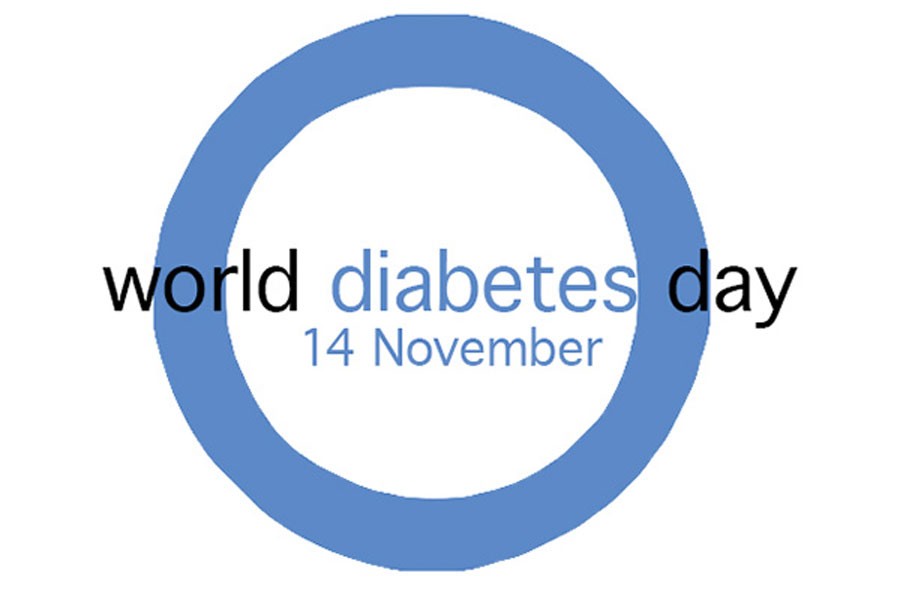Introduced in 1991 by the International Diabetes Federation and the World Health Organisation in response to growing concerns about the escalating health threats from diabetes, World Diabetes Day (WDD) is celebrated every year on November 14. The day engages millions of people worldwide in diabetes advocacy and awareness.
World Diabetes Day became an official United Nations Day in 2007 with the passage of United Nations Resolution 61/225 proposed by Bangladesh. Bangladesh Diabetic Samity (BADAS) backed Bangladesh government in the task and became instrumental in campaigning for this resolution to keep diabetes firmly in public spotlight. The WDD logo was also adopted in 2007. The logo is formed of a blue circle - the global symbol for diabetes. Significance of the blue circle is overwhelmingly positive, portraying the unity of the global diabetes community. Across cultures, the circle symbolises life and health. The colour blue reflects the sky that unites all nations and is the colour of the United Nations flag.
Each year World Diabetes Day (WDD) centres on a theme related to diabetes. Topics covered in the past have included diabetes and human rights, diabetes and lifestyle, and the costs of diabetes.
The slogan chosen for this year's campaign is: Let us save our family from diabetes. Five key messages have been developed to inform the outputs and deliverables of 2019:
* Diabetes kills: 1 person every 8 seconds, 4 million people a year
* Diabetes doesn't discriminate: all ages, rich and poor, all countries
* Diabetes can no longer be ignored: 4 million lives lost a year,1 million amputations a year, millions lost in income and productivity
* Life-saving care, a right not a privilege: education, medicines, technologies
* Choose health: healthy food and environments, keep active, eat well. You can make a difference
The day is observed on November 14, to mark the birthday of Frederick Banting who, along with Charles Best, first conceived the idea which led to the discovery of insulin in 1921. WDD is celebrated worldwide by over 200 member associations of the International Diabetes Federation in more than 160 countries and territories, all member states of the United Nations, as well as by other associations and organisations, companies, healthcare professionals and people living with diabetes and their families.
BANGLADESH SCENARIO: The International Diabetes Federation (IDF) estimated that 7.2 million or 4.8 per cent people living in Bangladesh had diabetes in 2007 and by 2025 that number is likely to grow to 9.2 million or 6.1 per cent of the population. This explosion in diabetes prevalence will place Bangladesh among the top ten countries in terms of the number of people living with diabetes in 2025. At that time, 80 per cent of all diabetes cases will be in low-and-middle income countries.
The increase in the number of people with diabetes in Bangladesh is expected to follow global gender patterns, whereby more women than men will live with diabetes. WHO predicts that the number of women in the world with diabetes will double in less than 20 years. In Bangladesh, the number of women with diabetes will grow from the current 2.0 million to 4.0 million by 2025. During the same period, number of males with diabetes will rise from 1.8 million to 3.4 million. Recent empirical studies show the urban population with diabetes in Bangladesh is expected to increase dramatically over the next 20 years. This is due to a combination of urbanisation and migration from rural to urban areas.
However, awareness could go a long way towards preventing diabetes from taking a serious turn. It is in this context that awareness campaign can do a lot to even assure people suffering from the ailment. The future need not be gloomy; a full and healthy life is possible with diabetes. This is a very important message for all affected by diabetes. Developing countries typically focus on communicable diseases. Non-communicable diseases like diabetes have been neglected. More attention is required urgently before these countries are overwhelmed by the diabetes epidemic
Dr. Muhammad Abdul Mazid is former Secretary to the GoB , Chairman NBR
and Chief Coordinator, Diabetic Association of Bangladesh.
--


